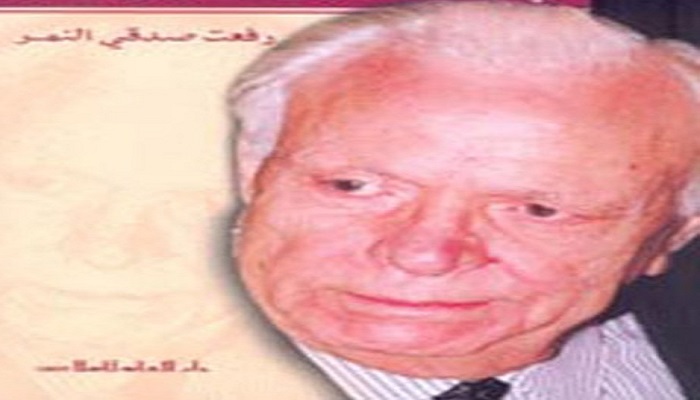Rifaat Nimer: The Sheikh of Arab Bankers

Translated by Tamara Barakat
Rifaat Nimer was born in Nablus in 1918. Upon the death of his father, his brother took over paying for his education expenses. He completed his primary education at Al-Hashemiya and Al-Salaheyeh Schools, and his secondary education at Al-Najah School. He attended Cairo University, majoring in Arabic Literature. He was also elected as the president of the first Arab Students Union.
His involvement in the struggle started with the Arab Revolt in 1936, when he carried arms and fought against the British Mandate. Due to his participation in the struggle and his activities in the student union, he was arrested in Sarafand. There, he met a number of intellectuals and businesspeople, including Abdul Hameed Shoman, the founder of the Arab Bank, who helped change the direction of his life.
Upon graduating from Cairo University in 1943, Nimer returned to Nablus and remained unemployed because the governmental administrations of the British Mandate prohibited him from working due to his political record. This changed when he encountered his companion in prison, Abdul Hameed Shoman, who offered him an opportunity to work at the Arab Bank. After proving his capabilities, Shoman appointed him as the assistant to the manager of the Arab Bank’s branch in Baghdad.
From here, his journey in banking institutions started, until he rightfully earned the title of the “Sheikh of Arab Bankers” given to him by the Journal of Banking.
In 1947, upon proving himself in his job, he was moved from the Baghdad branch to the head office in Amman. After that, he served as the assistant to the manager of the Riyad Bank, the manager of the Cairo Bank in the Kingdom of Saudi Arabia, and the manager of the National Commercial Bank’s branches in Lebanon and Syria. However, a small time after assuming this last post, Saudi Arabia called after Nimer and asked him to hand in his resignation, without offering any explanations.
The “Palestinian Rebel” was known for his Arab Nationalist beliefs and his vehement support of Gamal Abdel Nasser. He left Saudi Arabia and moved to Lebanon due to the mounting conflict between the KSA and Abdel Nasser over the Yemen issue.
In Beirut, he and a group of investors, established the Arab Union Bank, but he soon sold his shares in the Bank and established his own bank, called “Banque de Beyrouth pour le Commerce.” His bank expanded from the seventies until the nineties, and was one of the few Lebanese banks. However, in 1997, it was merged with the Byblos Bank. In 2000, Nimer decided to resign from the Bank and retire completely. He devoted himself to charity and social work, especially for the Palestinian people living in Lebanon.
The “Sheikh of Arab Bankers” wrote three books: On Banking and Economy, On Banking and Economy II: words, letters, and revisions, and Pages of my Life in Politics, Culture, and among People.
In addition to his work in banking and financial institutions, he held several positions, as follows:
Member of the Board of Directors and Governor of Palestine at the Arab Bank for Economic Development in Africa between 1975 – 1993, and the Arab Fund for Technical Assistance to African Countries between 1975 – 1998.
- Member of the Founding Board and Governor of Palestine at the Islamic Development Bank between 1977 – 1978.
- Member in the Palestinian National Council between 1964 – 1993.
- Deputy of the Director of the Palestinian National Fund, and served as the Acting Director several times.
- Member of the Board of Trustees at the Arab National Forum.
- Member of the General Secretariat of the Arab National Congress and the Islamic – National Congress.
- Member of the Board of Trustees at the Permanent Conference for Combating the Zionist Cultural Invasion, in Beirut.
- Member of the Board of Directors and the Board of Trustees at Al-Quds Institution.
- Chair of the Commission that supported the case filed against Sharon in the Belgium Courts.
On January 11, 2007, the fighter and economist, Rifaat Nimer died in Beirut, aged 88.





